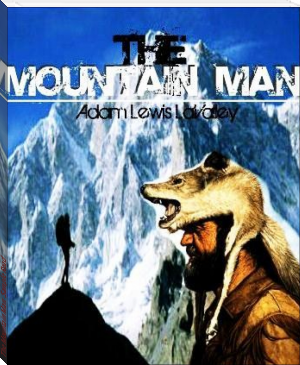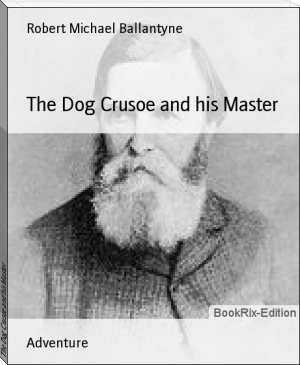The Rover of the Andes - Robert Michael Ballantyne (i have read the book txt) 📗

- Author: Robert Michael Ballantyne
Book online «The Rover of the Andes - Robert Michael Ballantyne (i have read the book txt) 📗». Author Robert Michael Ballantyne
"I knew him slightly. Antonio is his name, I think, but he is a villain of no note--an inferior bandit, though quite equal to his captain, no doubt, in selfishness and cruelty."
On arriving at the hut or small farm at the head of the valley, they found its owner, a burly, good-humoured Creole, alone with his mother, an old woman whose shrivelled-up appearance suggested the idea of a mummy partially thawed into life. She was busy cooking over a small fire, the smoke of which seemed congenial to her--judging from the frequency with which she thrust her old head into it while inspecting the contents of an iron pot.
There was plenty of room for them, the host said, with an air of profound respect for Pedro, whom he saluted as an old acquaintance. The house had been full two days before, but the travellers had gone on, and the only one who remained was a poor man who lay in an out-house very sick.
"Who is he?" asked Pedro, as he assisted Manuela to alight.
"I know not, senhor," replied the host. "He is a stranger, who tells me he has been robbed. I can well believe it, for he has been roughly handled, and there are some well-known bandits in the neighbourhood. His injuries would not have been so serious, however, if he had not caught a fever from exposure."
"Indeed," returned the guide, who, however, seemed more interested in unsaddling his mules than in listening to the account of the unfortunate man, "was it near this that he fell in with the bandits?"
"No, senhor, it was far to the west. The travellers who brought him on said they found him almost insensible on the banks of a stream into which he appeared to have fallen or been thrown."
Pedro glanced at Lawrence.
"Hear you that, senhor?"
"My Spanish only suffices to inform me that some one has been robbed and injured."
Explaining fully what their host had said, Pedro advised Lawrence to visit the stranger in his medical character.
"My friend is a doctor," he said, turning to the host, "take him to the sick man; for myself, I will put up the mules and then assist the old mother, for mountain air sharpens appetite."
In a rude, tumble-down hut close to the main building Lawrence found his patient. He lay stretched in a corner on a heap of straw in a state of great exhaustion--apparently dying--and with several bandages about his cut and bruised head and face.
The first glance told Lawrence that it was Antonio, the robber whom he had tried to rescue, but he carefully concealed his knowledge, and, bending over the man, addressed him as if he were a stranger. The start and look of surprise mingled with alarm on the robber's face told that he had recognised Lawrence, but he also laid restraint on himself, and drew one of the bandages lower down on his eyes.
Feeling his pulse, Lawrence asked him about his food.
He got little, he said, and that little was not good; the people of the farm seemed to grudge it.
"My poor man," said Lawrence in his bad Spanish, "they are starving you to death. But I'll see to that."
He rose and went out quickly. Returning with a basin of soup, he presented it to the invalid, who ate it with relish. Then the man began to relate how he had been attacked a few days before by a party of robbers in one of the mountain passes, who had cut the throats of all his party in cold blood, and had almost killed himself, when he was rescued by the opportune arrival of some travellers.
Lawrence was much disgusted at first by the man's falsehood. Observing the poor fellow's extreme weakness, however, and his evident anxiety lest he should be recognised, the feeling changed to pity. Laying his hand gently on the man's shoulder, he said, with a look of solemnity which perchance made, up to some extent for the baldness of the phraseology--
"Antonio, tell not lies; you are dying!"
The startled man looked at his visitor earnestly. "Am I dying?" he asked, in a low tone.
"You are, perhaps; I know not. I will save you if possible."
These words were accompanied by a kind look and a comforting pat on the shoulder, which, it may be, did more for the sick man than the best of physic. At all events the result was a sudden grasp of the hand and a look of gratitude which spoke volumes. The robber was about to give vent to his feelings in speech when the door opened, and the burly host, putting his head in, announced that supper was ready.
Giving his patient another reassuring pat, the young doctor left him and returned to the banqueting-hall of the mountain farm, where he found that Manuela, Pedro, and Quashy were more or less earnestly engaged with the contents of the iron pot.
CHAPTER FIVE.
LAWRENCE AND QUASHY BECOME "FLOSUFFICAL," AND THEY CAMP OUT BESIDE THE "GIANT'S CASTLE."
While the party were at supper the first gusts of a storm, which had for some time been brewing, shook the little hut, and before they had all fallen into the profound slumber which usually followed their day's journey, a heavy gale was howling among the mountain gorges with a noise like the roaring of a thousand lions. For two days the gale raged so furiously that travelling--especially in the higher regions of the Andes--became impossible. The Indian girl, Pedro, and the negro, bore their detention with that stoicism which is not an infrequent characteristic of mountaineers, guides, and savages. As for our hero, he devoted himself and all his skill to his patient--to which duty he was the more reconciled that it afforded him a good opportunity at once for improving his Spanish and pointing out to the bandit the error of his ways.
To do the man justice, he seemed to be fully sensible of the young doctor's kindness, and thanked him, with tears in his eyes, not only for his previous intention to save him from the tremendous fall over the cliff, but for his subsequent efforts to alleviate the evil consequences thereof.
It mattered nothing to the great warm-hearted, loose-jointed Englishman that when he mentioned these hopeful signs in his patient to Pedro, that worthy shook his head and smiled sarcastically, or that Quashy received the same information with a closing of the eyes and an expansion of the jaws which revealed the red recesses of his throat to their darkest deeps! Lawrence, being a man of strong opinions, was not to be shaken out of them either by sarcasm or good-humoured contempt.
Turning to the Indian girl for sympathy, he related the matter to her at a time when the other inhabitants of the hut had gone out and left them alone.
"You see,--Manuela," he said, with the frown of meditation on his brow, and his eyes fixed on the ceiling, "I have no belief in the very common idea that there is a soft spot in the heart of every man, however bad; but I do believe that the heart of the very worst of men may be made soft by the Spirit of God, and that He employs us, who call ourselves Christians, as His agents in bringing about the result. It is quite possible that I may have been thrown in the way of this robber for the very purpose of touching his heart through kindness--God's own motive-power--and that the Spirit will soften his heart to receive the touch."
He paused, and, withdrawing his gaze from the ceiling, observed that the girl's eyes were fixed on his face with an expression of perplexity and earnestness.
It then suddenly occurred to him that, having spoken in English, she could not have understood him.
"But you _do_ look as if you had some idea of what I have been saying, Manuela. Have you?"
"Si, senhor, some," was the reply, as she dropped her eyes with an embarrassed look and blushed so as to make her pretty brown face look alarmingly red.
Endeavouring to convey the same ideas through the medium of Spanish, Lawrence made such a bungle of it that Manuela, instead of expressing sympathy, began to struggle so obviously with her feelings that the poor Englishman gave up the attempt, and good-naturedly joined his companion in a little burst of laughter. They were in the midst of this when the door opened and Quashy entered.
"You 'pears to be jolly," observed the genial negro, with every wrinkle of his black visage ready to join in sympathetically, "was de jok a desprit good un?"
"Not very desperate, Quashy," said Lawrence, "it was only my bad Spanish which made Manuela laugh. If you had been here to interpret we might have got on better with our philosophical discourse."
"O massa!" returned the black--solemn remonstrance, both in manner and tone, putting to sudden flight the beaming look of sympathy--"don't speak of me 'terpretin' Spinich. Nebber could take kindly to dat stuff. Ob course I kin talk wid de peons an' de gauchos, whose conv'sation am mostly 'bout grub, an' hosses, an' cattle, an' dollars, an' murder, but when I tries to go in for flosuffy, an' sitch like, I breaks down altogidder."
At this point the Indian girl's tendency to laugh increased, but whether because of fresh views of the absurdity of what had passed, or because of some faint perception of the negro's meaning, Lawrence had no power to decide.
"I should have thought, Quashy," he said, with a return of his wonted gravity, "that a man of a thoughtful and contemplative turn of mind like you would have acquired the power of expressing almost any idea in Spanish by this time."
"T'ank you for de compl'ment, massa," replied Quashy, "but I not so clebber as you t'ink. Der am some tings in flosuffy dat beats me. When I tries to putt 'em afore oder peepil in Spinich, I somehow gits de brain-pan into sitch a conglomeration ob fumbustication dat I not able to see quite clar what I mean myself--dough, ob course, I knows dat I'm right."
"Indeed!"
"Yis; but de great consolation I has is dat de peepil I'm talkin' to don't onderstand me a mossel better nor myself; an', ob course, as noting in de wurl could show dem dey was wrong, it don't much matter."
"That is good philosophy, at all events. Isn't it, Manuela?" asked Lawrence in Spanish.
"Si, senhor," replied the girl, with sparkling eyes and a dazzling display of little teeth which seemed to indicate that she fully appreciated what was said.
"Strange," thought Lawrence--"so grave and pensive, yet at times so sprightly; so intelligent, yet, of course, so ignorant; so very brown, and yet so pretty. What a pity she is not white!"
He only said, however, with a sigh, "Is the gale abating, Quashy?"
To which the negro replied, with a responsive sigh, "Yis, massa,--it am."
After two days' delay our travellers were enabled to proceed. While their host was busy saddling the mules Lawrence took Pedro aside.
"I am anxious about that bandit," he said. "It is not his power of recovering I am afraid of, but our host's willingness to take care of





Comments (0)